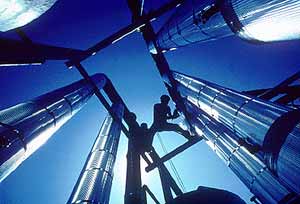July 12, 2007 (the date of publication in Russian)
Sergey Pravosudov
THE EUROPEAN UNION AS A BESIEGED FORTRESS
EC again seeks foes on the energy front
 In June, the European Commission elaborated a new draft of energy market regulations for the EU. One of the key items of this document is the ban for participation of non-EU companies in purchase of assets of European corporations in case of their restructurization. The draft is already introducedto the European Parliament.
In June, the European Commission elaborated a new draft of energy market regulations for the EU. One of the key items of this document is the ban for participation of non-EU companies in purchase of assets of European corporations in case of their restructurization. The draft is already introducedto the European Parliament.
The discussion is going to be heated. In fact, key EU member states – Germany, France, and Italy – are against restructurization of energy companies on the EC's scenario.
The European Commission proposes to carve out gas- and electricity-distributing facilities from energy corporations. The Commission claims that such a reform would facilitate market competition and thus reduce prices.
Top managers of major European companies like E.ON, Gaz de France and ENI do not accept this approach. They believe that prices could be reduced by increase of export of gas from non-EU countries, as Europe's resource base is rapidly shrinking. European business leaders are convinced that arbitrary alienation of transport companies is unlikely to pay the expected benefit, as the sum does not change from permutation of items.
Instead of splitting, E.ON, Gas de France and ENI are rapidly expanding, overtaking smaller European companies. They have managed to convince the European Commission to refrain from its earlier intention to ban long-term contracts on gas deliveries with non-EU states. Having struck agreements with Gazprom for 20-30 years ahead, major European corporations feel sanguine about their future.
Realizing that a ban for purchase of European assets for non-EU states would be a draconic measure, the EC left a loophole for their companies: the new draft suggests that purchases in Europe may be allowed under the condition that corresponding non-EU countries provide access to their markets for European companies.
However, the definition of "providing access to markets" raises doubts. For instance, Russia could hardly be blamed for reluctance to cooperate with foreigners on its own territory. In particular, Russia's Gazprom and Germany's Wintershall have been cooperating for many years in West Siberia, where their joint venture Achimgaz, a 50:50 ownership, extracts gas from the Urengoi area. Recently, the two companies, along with E.ON, signed an agreement on joint development of the Yuzhno-Russkoye area. In exchange for access to Russian resources, European companies provided a share of their assets in their countries.
Latest bilateral deals continue the described tendency of mutually favorable partnership. Today, Gazprom is going to invest in (ex-Yukos-owned) Arctic Gaz and Urengoil gas extracting companies together with Italy's ENI and Enel. The latter Italian company has already purchased a number of energy generating assets in Russia. Similar intentions were recently announced by the top management of E.ON.
Thus, in case EC's proposals are accepted in their present version, Russian companies are not going to face any legal restrictions. However, if political considerations get the upper hand again, the principle of "access to markets" acquiring a biased interpretation (for instance, if reluctance of a particular non-EU company to sell out assets, "vitally important" for an EU company, is arbitrarily regarded as violation of this principle), it will be hard to avoid serious problems.
It is natural that Europeans would like to acquire more assets in Russia than they are presently offered. In order to succeed, Europeans should think what they could offer in exchange. Many new opportunities are going to emerge in exploration and development of the gigantic Shtokmanovskoye gas province on the shelf of the Barents Sea.
Sergey Pravosudov is the Director of National Energy Institute, Moscow
Number of shows: 1090
 ENG
ENG 

 ENG
ENG 
